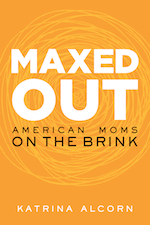I spent my 20s writing, doing non-profit work, and traveling the world with a dusty backpack. I didn’t care about money. I always had enough to pay my share of the rent and utilities, and a little extra to get a burrito and a beer with my housemates. I was cash-poor and time-rich. I was having adventures. I was pretty happy.
When I turned 30 and had my first child, my relationship to money changed profoundly. I wanted to own a house. I wanted security. In the high-priced Bay Area, that meant quitting journalism and non-profit work, and finding a place for my talents in the corporate world.
I got a job that paid twice as much as I’d ever made before. My husband also left journalism and re-fashioned himself as a consultant. We were making what seemed like a ton of money to us, but it still wasn’t enough. Our new house needed furniture. My job required nicer clothes. Daycare, diapers, and organic baby food were expensive. As we entered a state of chronic busyness, we starting paying for time-saving extras: a housekeeper, an accountant, prepared food, a gardener.
What about the future? Oh no! We’d forgotten to protect ourselves against unknowable catastrophe! We started retirement plans, and college funds for the kids. We bought life insurance.
Then it started to bother us that we were still driving a 12-year old station wagon with stained upholstery. We needed a better car. Then it started to bother us that we lived behind a car wash. Everyone we worked with seemed to live in a nicer neighborhood. We had to catch up!
At some point, of course, I realized I wasn’t happy. I was trapped. I had money, but not time. It was like being surrounded by food, and dying of thirst.
It turns out that there is a way out of this mess. There are people all over this country–both women and men–who have made a conscious decision to value their time more than their money. Against the formidable current of popular culture, they have decided that this may be the only life they will ever have, and they’re going to live it fully.
This is the subject of Shannon Hayes’ new book, Radical Homemakers [1]. 
I should mention here that I met Hayes once, about a year ago, although I don’t know her well. She lives near my mother’s house in a picturesque part of upstate New York. She’s one of those people who glows with good health. When she stopped by to pick up some eggs from my mom’s chickens, I remember thinking, “How do I get my skin to look like hers?”
Hayes has a PhD from Cornell, but instead of climbing a career ladder, she’s decided to live a modest life writing books (which she self publishes) and helping her family run their farm. She and her husband home-school their two daughters, take an inordinate amount of joy in growing and cooking their own food, travel for extended family vacations every year, and often have time to take naps. The naps alone make me think she’s on to something.
In Radical Homemakers, Hayes neatly summaries the dilemma mothers face in context of the feminist movement:
In the old paradigm, women chose the gilded cage or the glass ceiling. If they chose the gilded cage and stayed home, they became slaves to the marketplace image of the happy (shopping) homemaker. If they opted for the glass ceiling, they entered the workforce, where they became enslaved to their employers, and hoped they could fulfill their family dreams without getting tossed out like a used Kleenex…
She says that she and the people she calls “radical homemakers” are rejecting those choices and instead, investing themselves “in the support of family, community, and environmental stewardship, so that those things, in return, will pay them lifelong dividends.” They are doing this by giving up conventional employment and instead, embracing the domestic arts and a sustainable home life.
Hayes traveled the country with her family interviewing other radical homemakers. The portraits she paints of their lives are truly inspiring. They don’t make a lot of money–on average about $40,000 for a family of four, which is roughly 40% below the national median family income–but they’re better off than many of us in terms of the quality of their food, their time, and their relationships.
What’s radical about these homemakers is how much traditional common sense they employ. By “traditional” I don’t mean they’re trying to go back to the world of the 1950s. If anything, they’re living in something more akin to the 1750s, (where, for instance, men and women both do household chores, neighbors make up a large part of one’s social circle, thrift is highly valued, and many food and services are obtained through barter) while embracing all the benefits of 200 plus years of enlightenment. They’re also asking some very important questions about the assumptions we’ve made as a society:
What’s an economy for? Isn’t it supposed to serve everyone? Are families really served by an economy where employees are overworked, where families do not have time to eat meals together, an economy that relentlessly gnaws at our dwindling ecological resources?
Sustainability. There’s a thought. As someone who depleted her resources trying to do it all, I’m ready for something sustainable. I’m not ready to grow all my own food and I think our local school is doing a better job educating my kids than I would, but I’m in no hurry to jump back into full time employment, either. I’m grateful to the Hayes and her tomato-canning feminists for offering an alternative to the alienation of modern life.
Crossposted on MomsRising.org
[1] Radical Homemakers, Shannon Hayes, Left to Write Press, 2010.





{ 9 comments… read them below or add one }
I recently read Radical Homemakers. It’s fantastic! For those of us who may have wandered away, Shannon Hayes is offering us guidelines for living a fulfilling and responsible life. For those of us who already live by similar guidelines, her book is reaffirming.
And all this time I thought I was just “low income”- how refreshing! I would rather be radical anyday. I look forward to reading that book, thanks for the reccomendation and the suggestion to value time over money.
Definitely want to read this book. I’ve been house hunting in the Bay Area recently and am disturbed that I make more than I’ve ever made in my life but can still only afford to live in barely inhabitable homes in high crime areas. My mind runs in circles as I sit at work – at a job I took when I decided I was going to adopt as a single parent – and ponder if it’s really worth it. Not parenting – love that – but the job with the golden handcuffs. Is the security (good pay, health benefits, retirement) worth giving up on more rewarding work and am I crazy to be thinking of buying a house that will tie me to the job forever? I’ll read the book.
Wow! This review came to me through a web alert, and it is just a terrific piece of writing. What a vividly written post about your personal experience with this phenomenon, Katrina! Y’all are in good company in your questioning….And Kim, even a single mom can do it. Check out Sylvia Tanner’s story in the book when you get it. She is a marvel!
This just in:
The New York Times just published a story today about radical homemakers. The author, Peggy Orenstein, plays off the title of Michael Pollan’s popular “Omnivore’s Dilemma” calling them “femivores.” Not sure if I get the name–people who eat feminists? feminine eaters? feminists who care about food?–but the story is interesting.
In the story, Orenstein (who is based here in the Bay Area) muses about her own choices, as we all seem to be doing these days:
“What constitutes “enough”? What is my obligation to others? What do I want for my child? Is my home the engine of materialism or a refuge from it?”
Read the whole story here:
http://www.nytimes.com/2010/03/14/magazine/14fob-wwln-t.html
As a fellow activist, I think you’re putting your finger on an important, related issue: how we carve out a living, stay balanced (enjoying relationships, family and fun), and stay engaged as activists, organizers, citizens, etc. I think this is particularly difficult when you have to start providing for a family and its a dilemma that I’d like to avoid (maybe you can give me some cousinly advice (-; ). Clearly these dilemmas are exacerbated by gender as well.
Another nice point your post raises is about the false promise of American middle-class prosperity. Does attainment of a certain level of consumption really provide for a good life? That’s definitely a paradox for me in the work I’ve done as a union organizer (and probably a paradox for many progressive organizers going back to the 40s and 50s). Material advancement doesn’t lead to empowerment or happiness unless its married to change in the political, economic, and social structures that shape our lives. For me building community is important in that regard. Also, a thirty hour work week would be a good step forward for our gross domestic happiness, and lower unemployment too! hahah
Anyway, that’s just some random musings. I’ll be following the blog!
This is really inspirational, and spoke very directly to some of my own life-evaluation thinking that I’ve been doing. Though my circumstances are different (to start with, I have no children, and I have it easy compared to many), my sentiments are very similar. I’ve been having this internal conversation about how I ended up where I am versus where I want to be. It’s not that I’m unhappy, but that I wish I had more time to live life and do the things I enjoy most—yes, we only have this one life to live! I try to stick to 40 hour weeks as much as possible, but that’s actually not the problem. The problem is that I can’t take 3, 6, 9, 12 months off to travel, volunteer, spend more time with my partner, or even just do something different—we just cannot afford it. I’ve never been much of a ladder climber, and I still have no interest in being one, but now that I’m in my 40s I find myself wondering what’s next, and how will my choices today affect our life in 20, 30 years. It’s no longer about how to make more money, but rather how to learn to live with less of it. There is so much more that I want out of life, and I know what it might take to make it more fulfilling, yet we find ourselves supporting a set of priorities that no longer apply, and that are in some ways conflicting with a new set of emerging priorities. I find myself wondering how or whether I could ever get myself to a place that would allow me to stop supporting those old priorities and begin living with the new ones.
Different circumstances, different responsibilities, different priorities, but in the end it seems that we’re talking about the same thing.
A friend just sent me this link to the Institute of Urban Homesteaders for those of you in the Bay Area:
http://www.iuhoakland.com/index.html
This is from their site:
Our mission is to
* Offer affordable classes in the art of living in an urban environment
* Preserve a slower, more intentional, more sustainable and more pleasurable way of life
* Rescue the lost arts of the garden, the kitchen and things done by hand
* Imbue everyday tasks with wonder and beauty
* Promote self-determination and the ability of each person to educate themselves
Impressive, definitely superb material. This blog is really awesome. I bookmarked it and definately will certainly return again.
{ 1 trackback }